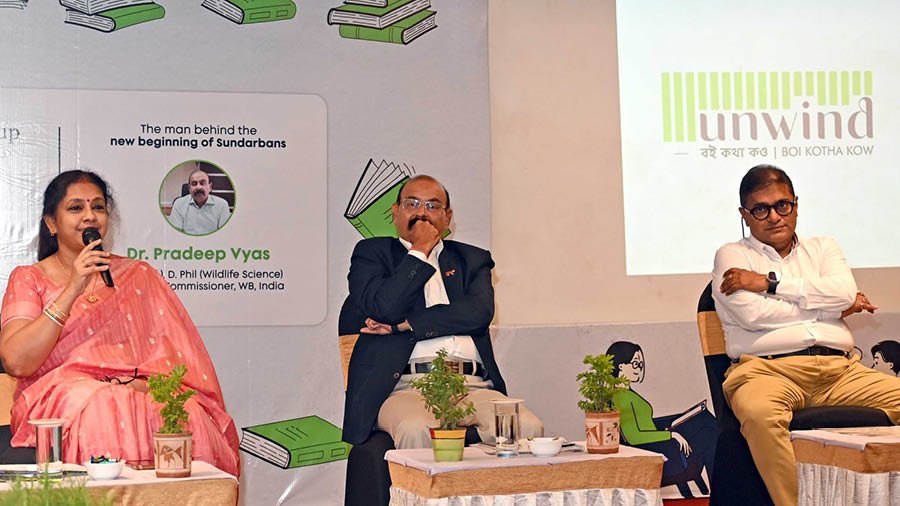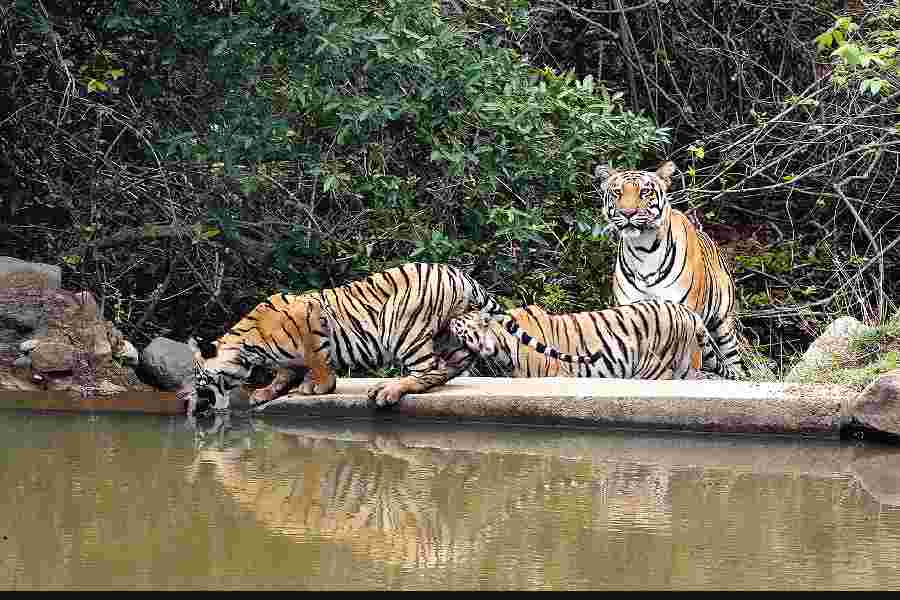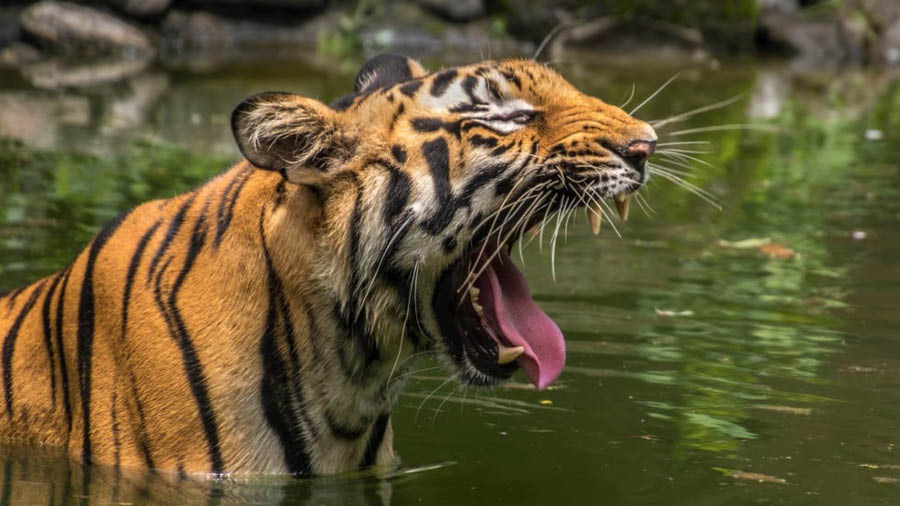Did you know there are nine species of tigers, three of which are lost and some are on the way to extinction? Or that India is home to 70 per cent of the world’s tiger population?
Such facts and more and the need to conserve the tiger were the focus of a talk by environmentalist Pradeep Vyas in Kolkata on July 27.
Vyas was instrumental in introducing many path-breaking strategies during his tenure for wildlife conservation and environmental protection. Holding the office of IFS, vigilance commissioner, State Vigilance Commission, West Bengal, Vyas has emerged as an eminent environmentalist who now carries interesting stories from the wild with him.
Therefore, the ‘Unwind-Boi Kotha Kow’ series of talk shows, an initiative of the Techno India Group, kick-started its human library chapter with Pradeep Vyas on July 27, ahead of International Tiger Day on July 29.
For the inaugural chapter, a talk was held at the Techno India University’s seminar hall with Pradeep Vyas in conversation with Shiladitya Chaudhury, communications consultant, wildlife photographer and restaurateur, and Manoshi Roychowdhury, co-chairperson, Techno India Group.
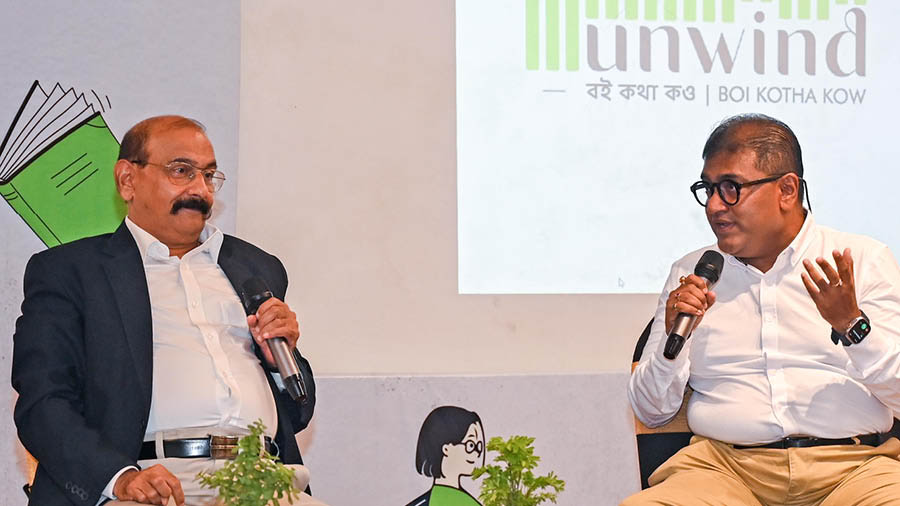
Shiladitya Chaudhury requests Dr Pradeep Vyas to narrate his experience working in the Sundarbans
Introducing the session and the speaker, Manoshi Roychowdhury said: “At Techno India Group, we constantly endeavour to provide our students with the best of resources to enable a rich learning experience. What could be better than creating an interactive environment through Unwind - Boi Kotha Kow, where their young minds can learn from the masters in different fields over thought provoking sessions? We are honoured to have Dr Pradeep Vyas with us today, as our first guest on Unwind on account of World Tiger Day sharing his rich and varied experiences. We would have renowned personalities from varied fields, every month, to participate in Unwind.”
Why International Tiger Day?
The talk began with Dr Vyas explaining the importance of International Tiger Day. He said: “Whenever we have an assigned day for something, we have to understand there was something lacking and it needed attention. Similarly, tigers day began when the 13 tiger range countries realised that from about 1 lakh tiger population, the number of tigers between 2000 and 2010 dropped to 3,500. That’s when the need for conservation was admitted and International Tiger Day was coined by the world leaders at St Petersburg on November 23, 2010.”
Vyas also said that among nine species of tigers — three species, Caspian tiger, Bali tiger and Javan tiger, have been lost already with some species like South China tigers being almost extinct. He also pointed out that since India is home to 70 per cent of the world’s tiger population, the country took various conservation strategies to save the tigers. He added that the number globally stood at 5,500 in 2022 with about 3,000 in India.
Sundarbans and Bengal tigers
Shiladitya Chaudhury asked Vyas to narrate his experience working in the Sunderbans. Recalling his days of posting in Sunderbans as director of the Sunderban Biosphere Reserve (SBR), he said: “I came to Sundarbans in 2001. Before I was posted in SBR, a tiger had once entered a village and harmed no one. But it was still killed and chopped into pieces and thrown into the river by an angry mob. The forest officials did not do anything to stop them. When I joined, I held meetings to understand the situation and realised that things were not in order.”
Vyas undertook various strategies to conserve the tigers in Sunderbans. He was involved in establishing India's first tiger rescue centre for injured and old tigers unable to prey and survive in the wild. This helped in managing the load on Alipore zoo where rescued tigers used to be brought.
Talking about whether tigers were man-eaters, he explained: “Tigers are not man-eaters genetically. They will prey on humans only if they have dearth of food. This is what makes the Sunderbans tigers man-eaters. The lack of other small animals to prey over the years made these tigers taste human blood."
Elaborating on the Sunderbans tigers, Vyas said: “Tigers in Sunderbans have adapted incredibly to the ecosystem. These tigers have been surviving on salt water for years. Studying the kidneys of these tigers should be considered. Also, they are great swimmers. The maximum kilometres a tiger once swam was recorded as 18km. I have seen tigers swim a distance of 7-8km at the maximum.”
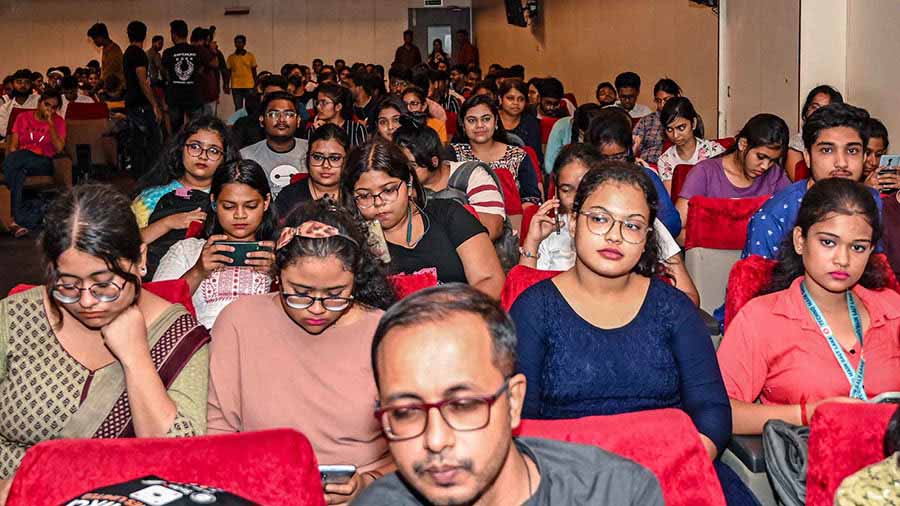
Students from various departments of Techno India University joined the session
About Unwind-Boi Kotha Kow
In continuation with its journey of providing a holistic educational environment to students of various disciplines, Techno India Group has begun a series of innovative talk shows, named Unwind-Boi Kotha Kow. The concept of Unwind is similar to The Human Library, an organisation which started a movement in Copenhagen, Denmark in 2000. It aims to address people’s prejudices by helping them to talk to those they would not normally meet. The organisation uses a library analogy of lending people rather than books.
Unwind is a monthly talk show with a difference, to be held amidst the familiar settings of the Techno India campus and each show will feature a specialist who will answer questions from the moderator and the students present.
At the end of the talk, Vyas answered questions from students about preparing for pursuing a career as an Indian Forest Service (IFS) officer, joining Bonya Pran Sathi Prokalpa and more.
Speaking about the session, Shiladitya Chaudhury said: “It was an enticing session and hearing Pradeep Vyas’s stories always gives you goosebumps. Being a wildlife photographer, I have always looked up to him. I am sure everyone in the audience today will take back a lot of knowledge and wisdom. Thanks to Techno India for organising it.”
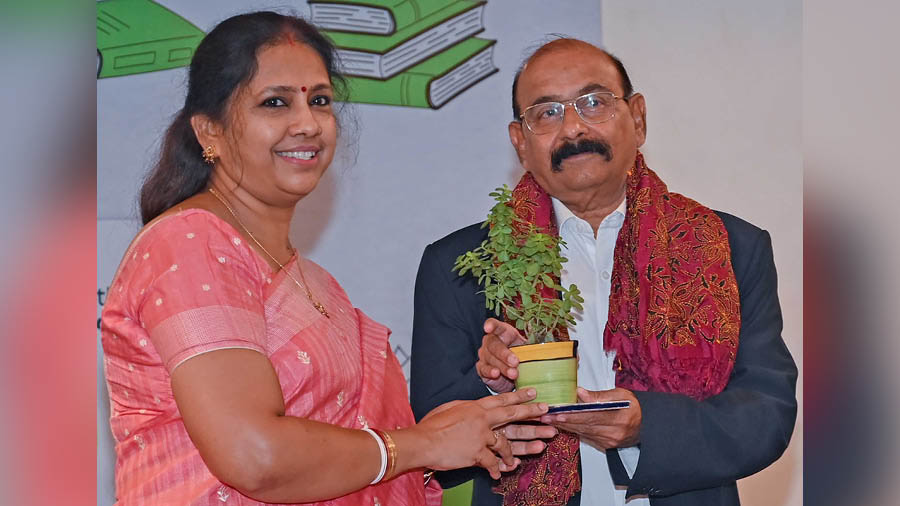
Techno India Group co-chairperson Manoshi Roychowdhury felicitates Dr Pradeep Vyas
